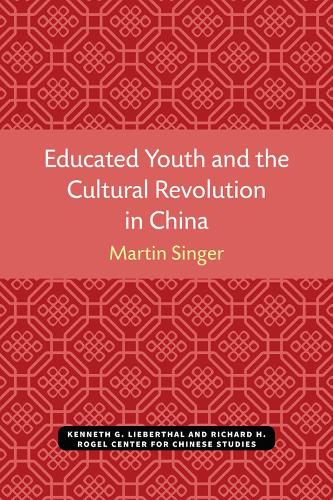Readings Newsletter
Become a Readings Member to make your shopping experience even easier.
Sign in or sign up for free!
You’re not far away from qualifying for FREE standard shipping within Australia
You’ve qualified for FREE standard shipping within Australia
The cart is loading…






The Cultural Revolution was an emotionally charged political awakening for the educated youth of China. Called upon by aging revolutionary Mao Tse-tung to assume a vanguard role in his new revolution to eliminate bourgeois revisionist influence in education, politics, and the arts, and to help to establish proletarian culture, habits, and customs, in a new Chinese society, educated young Chinese generally accepted this opportunity for meaningful and dramatic involvement in Chinese affairs. It also gave them the opportunity to gain recognition as a viable and responsible part of the Chinese polity. In the end, these revolutionary youths were not successful in proving their reliability. Too idealistic to compromise with the bourgeois way, their sense of moral rectitude also made it impossible for them to submerge their factional differences with other revolutionary mass organizations to achieve unity and consolidate proletarian victories. Many young revolutionaries were bitterly disillusioned by their own failures and those of other segments of the Chinese population and by the assignment of recent graduates to labor in rural communes.Educated Youth and the Cultural Revolution in China reconstructs the events of the Cultural Revolution as they affected young people. Martin Singer integrates material from a range of factors and effects, including the characteristics of this generation of youths, the roles Mao called them to play, their resentment against the older generation, their membership in mass organizations, the educational system in which they were placed, and their perception that their skills were underutilized. To most educated young people in China, Singer concludes, the Cultural Revolution represented a traumatic and irreversible loss of political innocence, made yet more tragic by its allegiance to the unsuccessful campaign of an old revolutionary to preserve his legacy from the inevitable storms of history.
$9.00 standard shipping within Australia
FREE standard shipping within Australia for orders over $100.00
Express & International shipping calculated at checkout
The Cultural Revolution was an emotionally charged political awakening for the educated youth of China. Called upon by aging revolutionary Mao Tse-tung to assume a vanguard role in his new revolution to eliminate bourgeois revisionist influence in education, politics, and the arts, and to help to establish proletarian culture, habits, and customs, in a new Chinese society, educated young Chinese generally accepted this opportunity for meaningful and dramatic involvement in Chinese affairs. It also gave them the opportunity to gain recognition as a viable and responsible part of the Chinese polity. In the end, these revolutionary youths were not successful in proving their reliability. Too idealistic to compromise with the bourgeois way, their sense of moral rectitude also made it impossible for them to submerge their factional differences with other revolutionary mass organizations to achieve unity and consolidate proletarian victories. Many young revolutionaries were bitterly disillusioned by their own failures and those of other segments of the Chinese population and by the assignment of recent graduates to labor in rural communes.Educated Youth and the Cultural Revolution in China reconstructs the events of the Cultural Revolution as they affected young people. Martin Singer integrates material from a range of factors and effects, including the characteristics of this generation of youths, the roles Mao called them to play, their resentment against the older generation, their membership in mass organizations, the educational system in which they were placed, and their perception that their skills were underutilized. To most educated young people in China, Singer concludes, the Cultural Revolution represented a traumatic and irreversible loss of political innocence, made yet more tragic by its allegiance to the unsuccessful campaign of an old revolutionary to preserve his legacy from the inevitable storms of history.